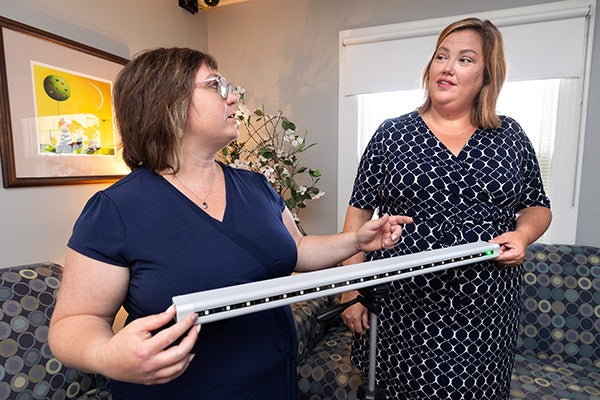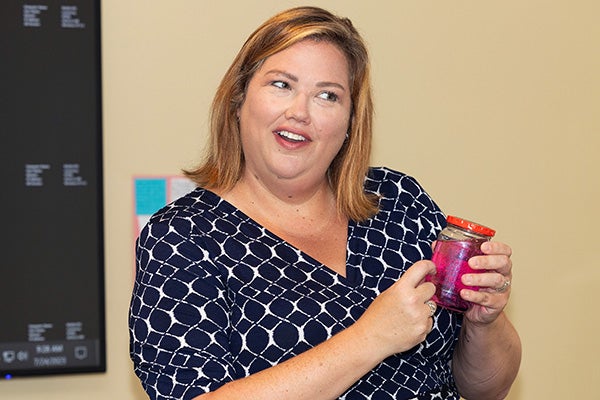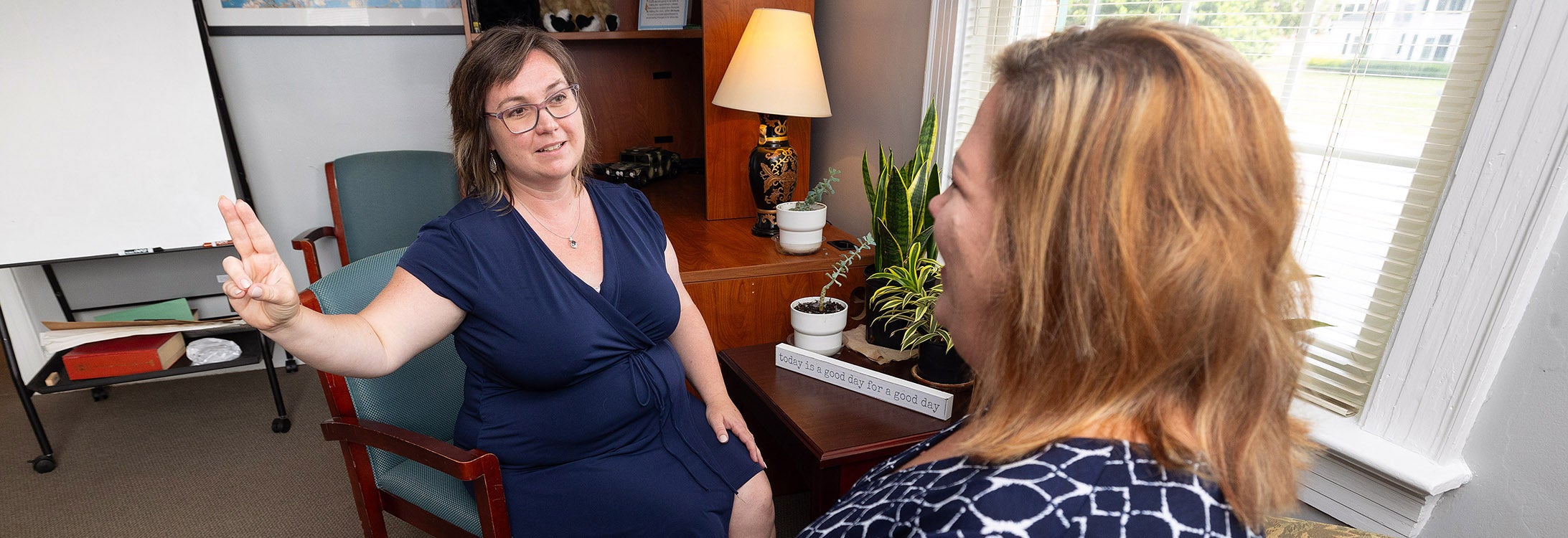EMPOWERING ENC
Grant focused on trauma-informed education, building a healthy community
Faculty members in East Carolina University’s College of Health and Human Performance are taking a multi-layered approach to trauma-informed education and implementation.
This focus stems from a four-year grant of $593,577 from The Duke Endowment to expand trauma-informed care in eastern North Carolina to respond to and treat adverse childhood experiences and intimate partner violence. ECU also is supporting the initiative with $94,135 in funding.

Roberts, left, and Matthews discuss a tool used in eye movement desensitization and reprocessing therapy.
Dr. Jennifer Matthews, professor in the Department of Health Education and Promotion, and Erin Roberts, director of the ECU Family Therapy Clinic in the Department of Human Development and Family Science, are collaborating and using their respective strengths and expertise to lead strategies to strengthen community resilience.
Matthews has a history of studying substance use and leads educational trainings using the community resiliency model. Roberts focuses on the impact of family trauma on mental health, and treatment through therapy sessions, specifically with eye movement desensitization and reprocessing. Recognizing stress and stress management also are important factors, Roberts said.
“To help build a really healthy community, not just at ECU but also beyond, and in order for all of us to live together and reduce some of the stress we are all experiencing, we need to put in infrastructure to be able to reduce everyone’s stress load,” Roberts said. “Part of that is preventing the trauma from even happening and part of that is treating the trauma that has already happened, so people are not operating at this really high level of stress and vibration. We want to get that down and have a whole community approach to it.”
ECU’s representatives will continue to work with Pitt County BRACE — a community collaborative formed in 2018 in building resiliency and courage to excel — and other community partners in training sessions. Program coordinator Lindsey McCallum, a recent ECU Master of Public Health graduate, has a role to build on community partnerships and outreach opportunities.
“Everybody in BRACE has some sort of piece in the trauma and resilience pie in and around Pitt County,” Matthews said. “These trainings are about building that infrastructure, so we have people in and around Pitt County who are trained in trauma legalities.”
A key component is intimate partner violence and its impacts. Roberts said there is a correlation between helping to prevent child abuse by reducing intimate partner violence.

Matthews talks about a resilience tube related to educational training sessions.
“In this grant, one of the pieces is prevention of adverse childhood experiences,” Roberts said. “In particular, it’s looking at intimate partner violence. An aim is to have more trainers or therapists trained in different areas to be able to lay the infrastructure to help prevent intimate partner violence. The hope is there are fewer couples experiencing intimate partner violence, and in particular, couples with children.”
Pitt County is the focus of initial sessions, but plans are to expand to other parts of eastern North Carolina. What is effective in Pitt County can serve as a base model, but details and strategies will likely shift from county to county, Matthews said.
They hope to benefit as many communities as possible as part of a long-term goal to reduce the number of adverse childhood experiences.
“Not only do we hope to build resiliency in communities, but also teach skills so they can then thrive when experiencing adversity,” Matthews said. “In resilience, it’s not just about bouncing back. It’s about taking and learning and growing from those experiences, so you can then thrive and move forward. With post-traumatic growth, that is where some of the relationship-building and the resiliency and emotional regulation pieces come in.”
Roberts said the COVID-19 pandemic might have added to long-term challenges people face, which trauma-informed practices can help in the recovery process.
“Experiencing chronic stress and chronic trauma impacts people,” she said. “I think what we are looking at, especially after the COVID-19 pandemic, is we have a community that has experienced quite a bit of trauma, on top of potentially having lifetimes of trauma.”
Based in Charlotte and established in 1924 by industrialist and philanthropist James B. Duke, The Duke Endowment is a private foundation that strengthens communities in North Carolina and South Carolina by nurturing children, promoting health, educating minds and enriching spirits. Since its founding, it has distributed more than $4 billion in grants. The endowment shares a name with Duke University and Duke Energy, but all are separate organizations.
This funding to ECU is supportive of building a foundation for desired outcomes.
“We want there to be long-term sustainability, even after the grant is over,” Matthews said.
